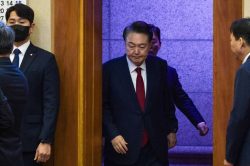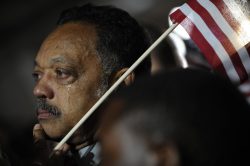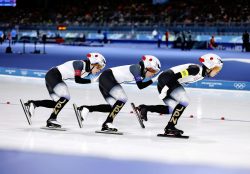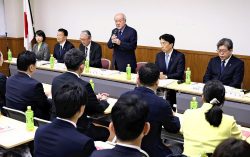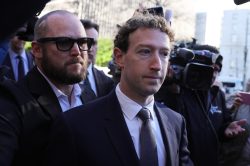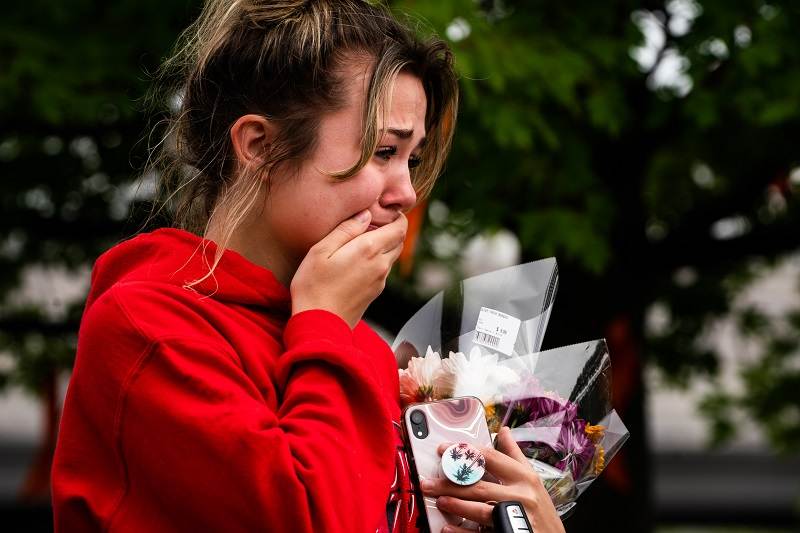
A visitor cries during a visit to the memorial on July 6 near the crime scene of the Highland Park, Ill., shooting.
19:38 JST, July 10, 2022
HIGHLAND PARK, Ill. – From this leafy suburb along Chicago’s North Shore, residents had watched as mass shootings cast a deadly scourge from coast to coast, leaving a relentless pall of havoc and heartache in their wake.
Just weeks ago, more than 100 people had taken to the streets of downtown Highland Park to call for stronger gun control laws in the aftermath of the elementary school massacre in Uvalde, Texas. They called out the names of other cities that had suffered horrific bloodshed: Newtown, Conn., Las Vegas, Pittsburgh, Parkland, Fla., Buffalo.
They did not imagine it would be Highland Park up next on the seemingly unending carousel of American carnage.
In a close-knit community that locals refer to as a “modern Mayberry,” where generations have felt safe enough to leave their front doors unlocked and where police haven’t investigated a single homicide since 1994, a simple message has been shared again and again among anguished residents since Monday’s mass killing: “How could this happen to our sweet little town?”
“When Texas happened, I had a quick thought of, ‘Could that happen here?’ . . . But then I thought, ‘Not us, not this place,’ ” said Michael Belsky, Highland Park’s former mayor. “When people say it can happen anywhere, I don’t know that anyone really believed that included here.”
On Tuesday evening, Belsky walked along Central Avenue, joining stunned neighbors who stood staring past billowing yellow caution tape into the heart of downtown where a gunman with a semiautomatic rifle scaled a roof and took aim at one of the community’s most cherished traditions – the annual Fourth of July parade – killing seven people and injuring more than 40 others.
Satellite trucks hummed nearby as reporters from across the country talked over each other in live shots. Lights from police cars flashed on the buildings, illuminating the empty lawn chairs and strollers left abandoned along the sidewalk where Belsky had often stood to watch the parade with his own kids when they were young.
To Belsky, it looked like the aftermath of tragedy from other towns he’d seen on television, not Highland Park. “I couldn’t believe this was my hometown, this crime scene,” Belsky said. “No one can believe it. . . . We’ve always thought our kids are safe, our schools are safe, our town is safe. But now, we know that’s not true.”
A town of 30,000 that somehow seemed smaller than that, Highland Park has long felt like a refuge – far away from the spiking homicide rate of Chicago, 30 miles to the south, and the daily gun violence that has plagued other American cities. Its quaint streets and picturesque homes were the backdrop for touchstone 1980s films like “Sixteen Candles” and “Ferris Bueller’s Day Off,” cinema that shaped the perception of the American high school experience for a generation.
About a third of the population is Jewish, according to estimates from local faith leaders, their presence dating back more than a century to when Jewish families made Highland Park their home after being rejected by other Chicago suburbs.
“It’s the kind of town where you go into a restaurant, and you’re going to know half the people there,” said Rabbi Evan Moffic, who leads Makom Solel Lakeside, one of several large synagogues in town. “There are many families where multiple generations live in the town, and children who grow up here come back and live here. So it’s very special in that way.”
His congregation and others had already been shaken by acts of violence against the Jewish community – most recently a January incident in which a gunman stormed a synagogue in Colleyville, Texas, in an hours-long hostage crisis.
Moffic estimated that about 100 families – about half of his synagogue – were at Monday’s parade when gunfire erupted. A bullet hit one of his congregants, an older woman, embedding in her cheek. She survived.
After the shooting, word quickly circulated around town that security officers at the Central Avenue Synagogue had encountered a man resembling the suspect, Robert E. Crimo III, at their most recent Passover services. The synagogue, located near the site of Monday’s shooting, said in a statement that the unidentified man appeared “out of place” but ultimately left without incident.
Though law enforcement officials have said they have found no evidence that the accused gunman’s motivations stemmed from race or religion, the incident has unsettled a Jewish community that already felt “deeply vulnerable,” Moffic said.
On Wednesday, his synagogue held a vigil for the victims that was organized in part to encourage a shattered community to come together in person and mourn. But like a handful of other religious institutions that held memorial events in recent days, his synagogue also chose to live-stream its event, in part because of the awareness that some traumatized community members have felt reluctant to leave the house or be around large crowds since Monday.
“Even people who weren’t there, the feeling of safety has been punctured,” Moffic said. “Human beings are very resilient . . . but right now, I think there’s little bit of an air of fear.”
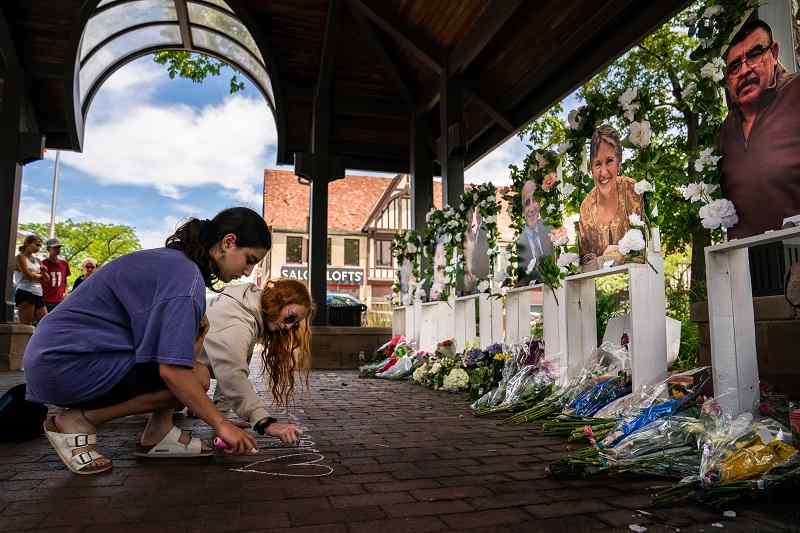
Visitors write “Stronger Together” in chalk in front of portraits of the victims from the Highland Park shooting
The trauma has played out not only for people who were in the line of fire but friends and families of those who came very close to losing their lives.
Gerry Keen and her husband, Steven, were at their usual parade spot – in front of the Gearhead Outfitters store at Central Avenue and Second Street – when gunfire erupted. After four gunshots, the couple fell to the ground and pretended to be dead, hopeful the gunman would aim elsewhere.
After a few minutes, Gerry Keen glanced up and saw a man later identified as Nicolás Toledo-Zaragoza, a grandfather in a wheelchair who had been sitting near her. She saw his head. And lots of blood.
“We knew he was dead,” Keen said. The couple joined others who ran into the sporting goods store to escape the gunfire. Through the window, Keen finally saw the complete scene for the first time: a ground littered with remnants of the parade, including tiny U.S. flags, empty chairs and water bottles, alongside bodies and pools of blood.
“It was a ghost town of horror,” Keen said.
Days later, Keen said, she cannot stop hearing the gunshots – a sound she’d never heard before. The 76-year-old grandmother, who has spent most of her life in Highland Park and enjoyed the safety and comfort of the city, said she has been unable to go out in public because of fear.
“I am not OK,” she said.
Members of her family – including her children and grandchildren – are equally traumatized, even though none of them were there. They keep reminding Keen and her husband that they could have been killed. “They keep calling multiple times a day,” Keen said. “They want to know that we are still here.”
Allison Kamen, 50, was sitting across the street from the Keens with her family when she heard what she thought were fireworks. Then they realized the sounds were bullets and dove for cover. Her father was hit by a bullet fragment – though not seriously injured.
While grateful that none of her family were killed in the attack, Kamen felt anguish about the damage it had done to the community and to an event that she had attended for nearly her entire life. Born on July 4, Kamen recounted a cherished family story of how her father had left the hospital the day of her birth to run up and down the parade route announcing the birth of his daughter.
“Highland Park is my safety net,” she said. “It is the safest place . . . But the sweetness of the town has been damaged.”
Still in shock, Kamen wondered if she could ever return to the parade.
On Monday, hours after the attack, the city was quiet and still, as scores of law enforcement officers descended on the bedroom community as they have in other places scarred by mass killings. A warm summer night, one usually marked by the pops of fireworks or music or the smells of family cookouts, was instead a specter of empty streets and the sounds of a police helicopter zooming low over the city into the night.
As the days progressed, some have slowly started to emerge – walking from their homes to take in the vision frozen on Monday morning. A makeshift memorial began to take shape at the eastern end of Central Avenue, one that looked like others that have risen in places like Uvalde and Buffalo. There, as in those other places, rose wooden crosses with the names and photos of the victims, alongside piles of flowers.
At a candlelight vigil the day after shooting, someone handed out freshly printed white T-shirts with the phrase “Highland Park Strong.” People wiped away tears and shared long lingering hugs as some recounted the stories of where they were, what they heard and who they knew among the injured and killed.
Some noticeably kept their distance from the crowd – including a woman who stood alone staring down Central Avenue, toward the intersection where the attack took place, which was brightly lit by large flood lights as law enforcement continued to search for evidence.
Caroline, who declined to give her last name, said she had been running late to meet her family and was walking toward the parade route when she heard bangs that she now knows were gunshots, followed by terrified screams. “I wanted to be here,” she said of the memorial gathering. “But when I walked up and saw these all these people, I got nervous. I guess I don’t feel safe anymore.”
It’s a sentiment that leaders across the city say they’ve heard in recent days, as residents try to work through their emotions about the horror.
“I often used to tell my students, ‘We live in a bubble. We live in this wonderful area,’ ” said Moffic, the rabbi. “And now I don’t think I am going to say that anymore. We are now experiencing what so much of the country has experienced . . . including our neighbors in Chicago. And it’s all very painful.”
Top Articles in News Services
-

Survey Shows False Election Info Perceived as True
-

Prudential Life Expected to Face Inspection over Fraud
-

Hong Kong Ex-Publisher Jimmy Lai’s Sentence Raises International Outcry as China Defends It
-

Japan’s Nikkei Stock Average Touches 58,000 as Yen, Jgbs Rally on Election Fallout (UPDATE 1)
-

Trump Names Former Federal Reserve Governor Warsh as the Next Fed Chair, Replacing Powell
JN ACCESS RANKING
-

Japan PM Takaichi’s Cabinet Resigns en Masse
-

Japan Institute to Use Domestic Commercial Optical Lattice Clock to Set Japan Standard Time
-

Israeli Ambassador to Japan Speaks about Japan’s Role in the Reconstruction of Gaza
-

Man Infected with Measles May Have Come in Contact with Many People in Tokyo, Went to Store, Restaurant Around When Symptoms Emerged
-

Man Infected with Measles Reportedly Dined at Restaurant in Tokyo Station




